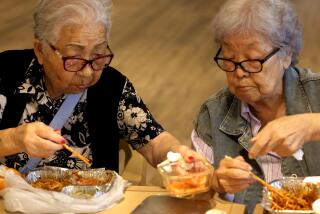City Closes Emergency Shelter for Homeless in Little Tokyo
- Share via
As Eugene Jones lined up for the last time Thursday to sleep in the city’s emergency shelter in Little Tokyo that is being closed, Los Angeles officials struggled to find beds for the 300 men, women and children who have been staying there.
“What I really want is a regular job,” the 25-year-old homeless man said, but he expected to spend today, instead, “looking for another shelter.”
But as of Thursday night, Deputy Mayor Grace Davis said that at least 200 beds could be available today in hotels run by the Single Room Occupancy Housing Corp. and the Weingart Center, the health and human services center for the homeless in the Skid Row area.
Representatives of these agencies, as well as others, including workers from the county Department of Social Services, state Department of Employment and Caring Hands, a social outreach group, gathered at the shelter at 411 East 1st Street Thursday night to talk with the homeless and to see if they could provide them any help.
The 300-bed shelter, set up in an abandoned print shop, was part of a 90-day temporary emergency program established by the city in January after four homeless people died on the streets in the freezing weather.
Earlier this week, the City Council decided not to grant an extension for the shelter, which is located in a seismically unsafe building scheduled for demolition this month.
The city approved another temporary shelter last January, a 90-bed facility at 527 Crocker St., which was granted an extension to continue operating through August.
The Little Tokyo shelter became controversial because of complaints from businessmen and residents in the area. Crime in the area rose 128% over the last three months, according to Los Angeles police statistics, and a businessmen’s association reported a 40% drop in business.
The 350 elderly residents of Little Tokyo Towers virtually stopped going out at night after a number of purse-snatchings and muggings and ventured out during the daytime in twos or in groups. The conditions of the last three months, said Mac Sasaki, the towers’ 71-year-old resident manager, “changed our life style.”
“We don’t really blame the homeless, but the (crime) increases happened,” he said.
Restaurant operators said transients routinely came into restaurants and panhandled from their customers.
Yoshikazu Shibano, manager of Suehiro Cafe on 1st Street, said, “One time they came in and took food from a customer’s plate.”
“We closed at night,” said Debbi Stone, co-owner of the Downtown LA Cafe, directly across the street from the shelter. Customers “didn’t want to be eating a nice dinner and look out the window and see 200 or 300 people lined up across the street, obviously in need.”
“I’m relieved that it’s being closed,” said Kenzo Okubo, chairman of the Little Tokyo Advisory Committee to the CRA and vice president of the Little Tokyo Businessmen’s Assn. He said his shop, Joseph’s Men’s Wear, has had about 25% less business.
More to Read
Sign up for Essential California
The most important California stories and recommendations in your inbox every morning.
You may occasionally receive promotional content from the Los Angeles Times.










